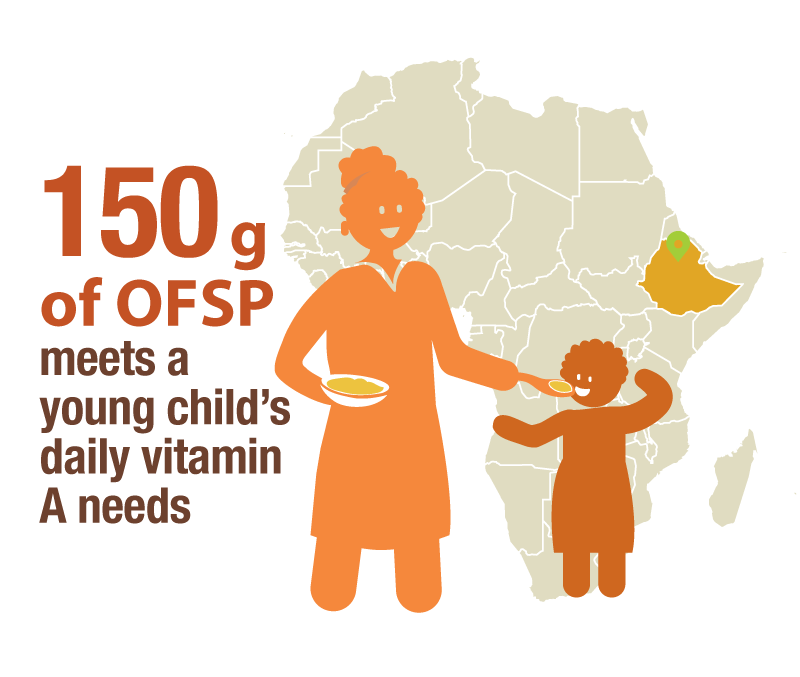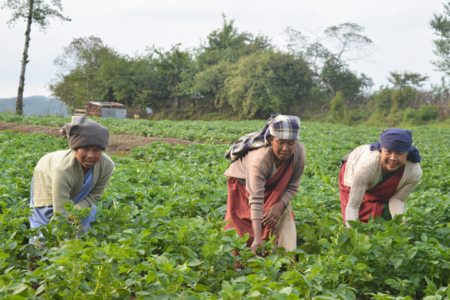
With three high-yielding, high-dry-matter, β-carotene-rich orange fleshed sweetpotato (OFSP) varieties
Daily consumption of orange fleshed sweetpotato (OFSP) is known to reduce Vitamin A deficiency (VAD) in children and women of reproductive age. This project increased the production and consumption of three high-yielding OFSP varieties rich in dry matter, pro-vitamin-A and β-carotene in the Amhara region, to improve food security and reduce malnutrition and child mortality.
Background
Chronic food insecurity and malnutrition pose significant public health problems in Ethiopia, particularly for women and children under five years of age in rural areas. The rapidly increasing population in the Amhara region relies on a food system affected by multiple problems, including droughts, pests, environmental degradation, and lack of market access. This leads to poverty and inadequate infant feeding practices, which increase the risk of common childhood illnesses, low mental development, stunting, and mortality.
Research has shown that daily consumption of orange fleshed sweetpotato (OFSP) in quantities as small as 150 g for a child and 200-300 g for an adult are adequate to meet Vitamin A needs. Yet 61% of Ethiopian preschool children suffer from vitamin A deficiency (VAD), a nutritional disorder linked to 80,000 child deaths a year in the country, while Vitamin A deficiency provokes night-blindness, measles, and diarrhea in women.
To combat these health threats, this project promoted the production and consumption in Amhara of three new OFSP varieties selected during participatory evaluations with men and women farmers in the Tigray, SNNPR, Oromia, and Amhara regions. These varieties have high yield potential, high root dry matter, and high levels of β-carotene, which the body turns into vitamin A. Moreover, they are better adapted to challenging agroecological conditions compared than currently available local and improved varieties.
Objectives
To improve nutrition and food security in vulnerable households with children under two years of age and women of reproductive age in target districts (“woredas”) in Ethiopia’s Amhara Region, contributing to a broader global initiative for nutrition-sensitive agriculture. This is being achieved through increased production and consumption of three OFSP varieties released in 2019 – following participatory evaluations that engaged men and women farmers – as part of a diversified diet among at least 10,000 vulnerable households in the target areas.
The following outcomes define this overall objective:
- To expand smallholder production of nutritious OFSP varieties in five districts of Amhara region.
- To strengthen rural and urban market demand for OFSP.
- To improve the utilization of OFSP among rural and urban consumers as part of healthier diets, including as complementary food for young children.
- To increase institutional and policy support for nutrition-sensitive agriculture.
Approach
The project was implemented in four districts of the Amhara region, where local agriculture and health offices partnered with CIP guided the selection of beneficiary households according to vulnerability criteria and declared interest in growing sweetpotato.
CIP strengthened capacities in the public sector to produce and supply high-quality early generation planting material through improved vine multiplication techniques by providing one research center and eight Farmer Training Centers with small-scale irrigation equipment and other technologies required for vine multiplication and managing demonstration plots. Extension agents and farmers were trained in improved agronomic and post-harvest handling practices to optimize the yields and nutritional qualities of the new OFSP varieties. To increase market demand for OFSP among rural and urban consumers, the project engaged schools, mass media, and community-based champions. Bahir Dar University staff developed new OFSP recipes appealing to local consumers, highlighting opportunities to integrate sweetpotato into local dishes.
The project trained health extension agents, district experts, women, and mothers of children under two years of age on nutrition and the value of OFSP. Trainees received resource material for follow-up training sessions and technical backstopping in the field. To ensure institutional and policy support of OFSP programs to address food security and malnutrition, meetings and workshops were held with relevant Regional Bureaus, NGOs, private sector, and public research and extension institutions at various stages of the project to review ongoing activities, catalyze collaboration and share lessons learned among stakeholders.
Expected outcomes
By the end of the project, 10,000 vulnerable households with children under two years of age and women of reproductive age in target districts of the Amhara region had improved their nutrition and food security through the cultivation and consumption of the new OFSP varieties, reducing the risk of child mortality and illnesses due to Vitamin A deficiency. At the same time, a decentralized OFSP seed production system was successfully established that can supply farmers with high-quality planting material for years to come. Local agriculture and health extension services have increased their capacity and adopted new tools to advise farmers on better OFSP production and post-harvest practices and the crop’s potential to improve nutrition and health.
Finally, increased demand for OFSP in Amhara region and improved access to quality planting material for backyard production and farmers’ fields offer new opportunities to improve rural income
| Key outcomes | |
| Number of smallholder households with children under 5 reached with OFSP planting material | 10,000 households (5 million units of planting materials) |
| Model and follower farmers trained on improved OFSP production and postharvest handling | 1,000 and 9,000 (at least 30% women), respectively |
| Health extension workers and district nutrition experts trained in OFSP and nutrition | 28 |
| Number of training and extension materials on OFSP production and handling distributed to target audiences in local language | 2,400 units |
| OFSP producers trained in basic harvesting and post-harvest handling skills and linked to nearby urban markets | 2,000 (50% women) |
| Women and mothers with young children trained on OFSP’s potential to improve nutrition | 2,400 |
Contact
Setegn Gebeyehu
CIP, Ethiopia
setegn.gebeyehu@cgiar.org
Thanks to our donors




